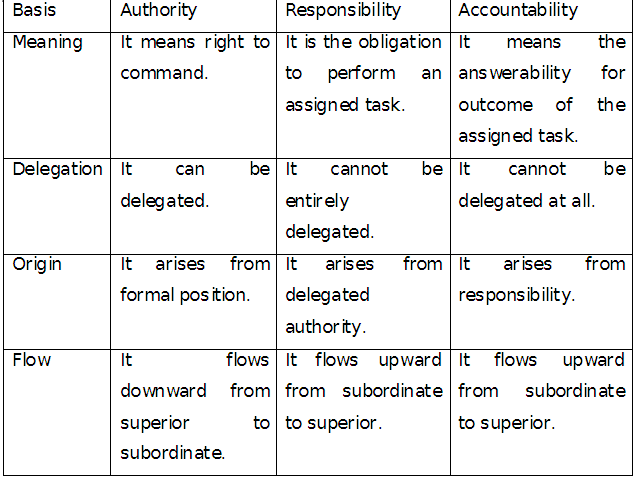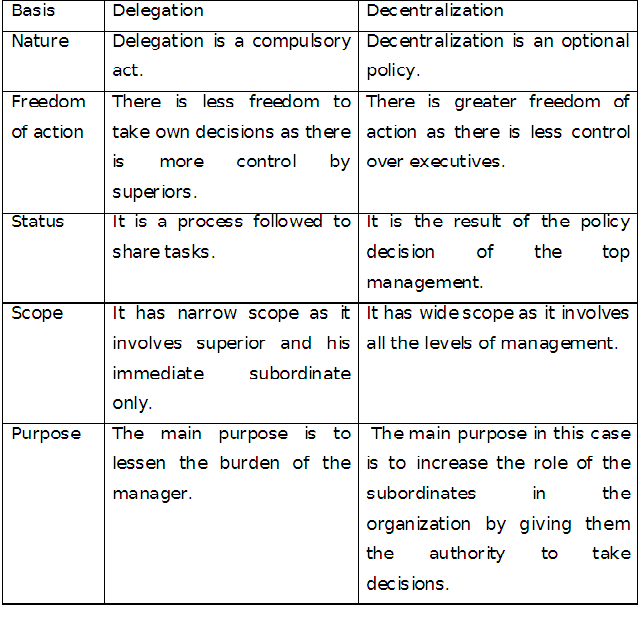Meaning of Delegation
Delegation refers to the downward transfer of authority from a superior to a subordinate. It helps a manager to extend his area of operations. Delegation does not mean abdication. Irrespective of the extent of delegated authority, the manager shall still be accountable to the same extent as before delegation.
Elements of Delegation
1. Authority:
Authority refers to the right of an individual to command his subordinates and to take action within the scope of his position. Authority arises from the established scalar chain. It also refers to the right to take decisions to get the work done.
Authority flows from top to bottom, i.e., the superior has authority over the subordinate. Authority is restricted by laws and the rules and regulation of the organization.
2. Responsibility:
Responsibility is the obligation of a subordinate to properly perform the assigned duty. It arises from a superior–subordinate relationship.
Responsibility flows upwards i.e., a subordinate will always be responsible to his superior. For effective delegation the authority granted must be commensurate with the assigned responsibility.
3. Accountability:
It means being answerable for the final outcome. It cannot be delegated and flows upwards. It indicates that the manger has to ensure the proper discharge of duties by his subordinates. The subordinate is expected to explain the consequences of his actions or omissions.
Difference in Elements of Delegation
Importance of Delegation
1. Effective management:
Employees are relieved from doing the routine work so they can concentrate on more important jobs and work more efficiently.
2. Employee development:
Employees get more opportunities to utilize their talent and this may take out their hidden abilities to perform complex tasks and assume more responsibilities improving their career prospects and preparing better future managers.
3. Motivation of employees:
Delegation has psychological benefits as it helps in building the trust and commitment. Responsibility builds the self-esteem of an employee and improves his confidence leading to improve his performance further.
4. Facilitates growth:
Delegation helps in the expansion of an organization by providing a ready workforce to take up leading positions in new ventures.
5. Basis of management hierarchy:
Delegation of authority establishes superior-subordinate relationships, which are the basis of hierarchy of management and indicates the degree and flow of authority.
6. Better coordination:
Authority, responsibility and accountability help to define the powers, duties and answerability related to the various positions in an organization which help to avoid overlapping of duties and duplication of efforts. This helps in developing and maintaining effective coordination amongst the departments, levels and functions of management.
Decentralization
Decentralization refers to systematic effort to delegate to the lowest level all authority except that which can be exercised at central points. By Louis Allen
In simple words, Decentralization means dispersal of decision making authority up to the lowest level of the management. It is when authority is shared with lower levels and is consequently placed nearest to the points of action an organization is said to be called decentralized.
Importance of Decentralization
1. Develops initiative among subordinates:
It helps to promote self-reliance and confidence amongst the subordinates. It gives them constant challenges and compels them to develop solutions for the various problems. Decentralization helps to identify those executives who can become dynamic leaders.
2. Develops managerial talent for the future:
The subordinates gain experience by handling the jobs independently and can be promoted to take up higher positions with challenging jobs. So, it helps in management education.
3. Quick decision making
Decisions are taken at levels which are nearest to the points of action and there is no requirement for approval from many levels so the process is much faster. There are also less chances of information getting distorted because it doesn’t have to go through long channels.
4. Relief to top management:
The top management is relieved of routine work of supervision thus; giving enough time for policy matters becomes easy.
5. Facilitates growth:
Greater autonomy to the managers at lower levels allows them to function in a manner best suited to their department and fosters a sense of competition amongst the departments leading to increase in productivity level and more returns which can be used for expansion purposes.
6. Better control:
Decentralization necessitates the use of innovative performance measurement systems. So, feedback system helps to analyze the gaps in performance and taking corrective action becomes easier.
Difference between Delegation and Decentralisation
Test Your Understanding


